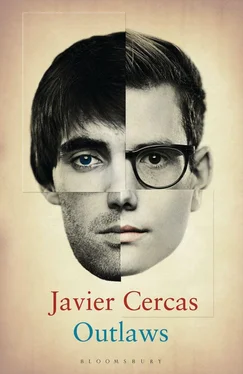‘After Gamallo was released, Cañas and I still saw each other, almost every time he visited one of his clients at the prison. As I told you before, we’d had a clash over Gamallo, but thanks to that my opinion of him had improved and now our relationship was excellent, so, if we bumped into each other on his way in or out of the prison (sometimes even in town), we’d say hello and chat for a while, though we always avoided talking about Gamallo. However, things must have got pretty complicated for Cañas when, shortly after Gamallo got sent back to Quatre Camins, that nutcase started accusing him on television of being complicit in the barbarities Gamallo had done to her. . I mean his wife. But, anyway, I imagine Cañas will already have told you all this; I only know what everybody knows. The thing is that for a while I didn’t see him. I asked about him and was told he was having health problems, though nobody specified what kinds of problems he was dealing with; then there was also a lot of talk about his involvement with the girl who visited Gamallo, it seemed to become the talk of the courthouse for a while, and ended up reaching me. Later, after some months (many months, maybe more than a year), Cañas reappeared: he started visiting his clients again, our paths started crossing again once in a while here and there and we went back to talking about anything except Gamallo again, until a moment arrived when I almost forgot Gamallo or when I stopped associating Cañas’ name with that of Gamallo.
‘It was around that time that Cañas showed up in my office again one afternoon. Years had gone by since he’d last done that and I thought he was coming to talk to me about one of the inmates. We chatted for a while and, when I thought he was going to leave and that it had just been a courtesy call or something like that, the lawyer put me right: he told me he’d come to see me because he’d agreed to defend Gamallo again and because he was going to put in an application for his transfer from Quatre Camins to Gerona Prison. I couldn’t believe my ears. You’re incorrigible, was all I could manage to say. Cañas smiled. You’re mistaken, he answered. I’m just a lawyer. And Gamallo is my client. I’m just doing my job. Sure, I said. Though I think you’re the one who’s making a mistake. In any case, I added, I appreciate your informing me of what you plan to do. Well, Cañas said then, and his smile turned a bit mischievous, a bit childish. Actually I haven’t come just to inform you. He took a sheaf of photocopies out of his briefcase and put it on my desk as he said: I’d like you to support the application. I looked at the pile of pages, without touching it. The decision to transfer an inmate rests with Correctional Institutions, but Cañas knew that the opinions of the prison superintendents (that of the receiving prison and that of the current one) were important; he also knew it wasn’t going to be easy to convince me to support his move, so he had come to the meeting prepared. He explained what the sheaf contained: the main thing was a report from the superintendent of the Quatre Camins prison supporting Zarco’s transfer, and a series of reports from various specialists; according to Cañas, only one thing could be deduced from these reports, and it was that the Zarco of today bore very little relation to the one who had first come to the Gerona prison, because the illness, the years and his own errors had taken away the strength and the halo of youth and converted him into an inoffensive inmate. Cañas ended up playing a sentimental tune. He said, more or less: When he arrived here last time, Gamallo was coming to recover his freedom; now he just wants to be allowed to live his final years in peace. I don’t think anyone has the right to deny him that.
‘As soon as Cañas finished speaking I sat up a bit in my chair, took the sheaf of pages, leafed through it for a moment without reading it and then I sighed and put it back down where it had been. Look, Counsellor, I said. Maybe you’re right: maybe Gamallo is no longer what he used to be. I’m not saying you’re not. What I do say is that, even half dead, that man is a headache. I paused and then continued: You know something? In a little over two years I’m going to retire. Don’t you think I too have the right to live this time out in peace? You know better than anybody that when Gamallo was in this prison my life was unbearable, and on top of that it did no good; I don’t want to go through that again. Besides, what good would it do to transfer him? Naturally the superintendent of Quatre Camins wants to be rid of Gamallo, but the truth is that his prison is much more modern and much better equipped than mine, especially to deal with Gamallo. So, don’t take it personally, but, if I can spare myself the presence of that man here, I’m going to. I hope you’ll understand. Cañas did not understand, or did not want to understand. We argued for a few minutes more. In the end we went our separate ways amicably, and, though the lawyer managed to get me to keep the reports on Gamallo, he did not manage to get me even to promise that, since I wasn’t going to support the move, I would at least not oppose it.’
‘But in the end you supported it.’
‘How do you know?’
‘I didn’t know, I guessed. Why did you?’
‘Support him? To be frank, I don’t know. One day Correctional Institutions called me to ask if I thought it would be good for Gamallo to return to Gerona and I simply couldn’t think how to say no. I suppose Cañas and the Quatre Camins reports must have convinced me between them that Gamallo was no longer a problem, that he was on his last legs.’
‘And were they right?’
‘Yes, this time they were. When they brought Gamallo to the prison I was surprised that a man could deteriorate so much in such a short time. He was skin and bones, had difficulty walking, he’d lost most of his hair and his face looked like a preview of his skull, with his black teeth, sunken eyes and fleshless cheeks. My first impression was that the man was no more than a walking skeleton; the medical reports confirmed it: he had once again exchanged heroin for methadone, but AIDS was devouring him from within and he was very weak, which meant that, at any moment, any minor illness could overcome his defences and wipe him out.
‘His myth had also collapsed. Not only did the press not mention a word of it, when he arrived in the city, but even in the prison his arrival didn’t provoke the slightest agitation. In spite of everything I decided to hedge my bets and assigned him his own individual cell with the idea of keeping him separate from the rest of the inmates. For Gamallo, this was a humiliating measure, which equated him with the lowest of the low — informers or rapists — but he didn’t protest, I think he already knew that because of the combination of his former celebrity and his physical weakness he was an irresistible target for the kids looking to make themselves respected, kids he no longer had the strength to confront; he didn’t protest when I tried to impose an activity programme that would keep him busy from morning till night either. How ingenuous! The activity programme, I mean: in his physical state, Gamallo couldn’t carry out any programme and, when I realized that, I understood that Cañas was right and the only thing we could do for him was to let him end his days in tranquillity. And that’s what I tried to do.’
‘At the end of the spring or beginning of the summer of 2005 Zarco returned to Gerona Prison and I started seeing him once a week again, often more than once. It wasn’t until then, almost thirty years after I met him, that I started to feel that what linked us was starting to resemble a friendship. Of course, I was still his lawyer, but the problem (or the advantage) was that, once we got him transferred to Gerona, he practically didn’t need a lawyer, or he needed one much less than he had before: after all, any fantasy of rehabilitation was ruled out, as was any hope of getting any release permits, and the legal matters we could deal with had been reduced to a minimum. By then, Zarco was physically a wreck; morally too: as Tere had told me, he was alone, nobody wanted anything to do with him, he was totally discredited outside and inside the prison and he no longer even seemed capable of playing the part of Zarco. This is important: as soon as I saw him again, still in Quatre Camins, before we managed to get him transferred to Gerona, I had the impression that the struggle within him between the person and persona was over, that the tendency to see himself as a victim and the arrogance were coming to an end and the magnificent façade of the myth was about to come tumbling down, revealing the prematurely aged, defeated and ill man in his forties behind it. At first, as I said, it was just an impression, but it made me see him in a different way, just as knowing that he was actually Tere’s brother changed my way of seeing him; it changed, although I don’t know how it changed: I didn’t know exactly what his relationship with Tere had been like — and I don’t think I wanted to know — but the truth is that he no longer interfered in my relationship with her, and nor did she in my relationship with him.
Читать дальше












